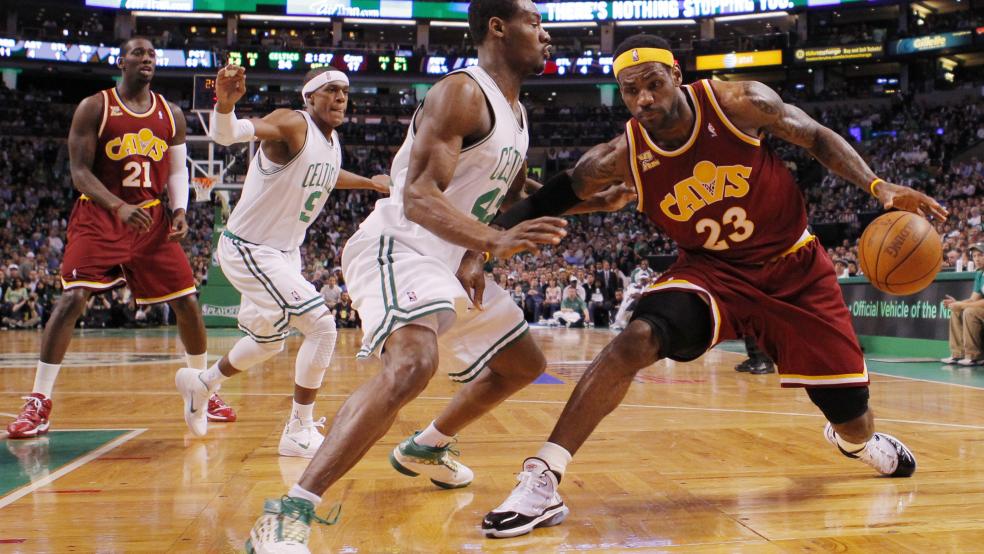Reaction to the NBA's new multi-year, multi-billion-dollar deal with Time Warner's (TWX) Turner Broadcasting and Disney's (DIS) ESPN has largely centered on the huge revenue increases for the professional basketball league and, by extension, the impact on player contracts. Starting in 2016, salary caps will rise significantly as more TV money is added to the owner's collective pot, and that means the league's foremost employees will be demanding more it.
A player such as Kevin Durant, the Oklahoma Thunder forward who will be a free agent in two years, could become the richest active athlete in the world. However, Durant's potential millions won't compare with the billions that may be involved in the streaming part of this deal between the NBA and two of the world's largest media and entertainment companies. That's right, the digital side of this deal is more interesting.
We know salaries will go up. What we don't know is what ESPN will do with streaming rights, and how the network will monetize them.
Related: 9 Big-Time, Big-Money NBA Draft Busts
Right now, Turner handles the streaming package of out-of-market games through "NBA League Pass," but ESPN now will have the ability to stream games. Although it remains unknown whetherESPN will compete with "League Pass," the possibilities and implications are fascinating, especially if you assume the network will offer a streaming service to people who don't have cable.
You see, Disney receives about $6 dollars per cable subscriber just for ESPN. It's an annuity any business would want, so why do something like offer games to non-subscribers?
Well, who knows how long this current lucrative model may last? Perhaps it is a hedge against the future possibility of a la carte cable and, heaven forbid, some customers choose not to have ESPN in their homes. This streaming deal could be a future hedge against that possibility.
More realistic could be the effort to get people in the fold who have money to spend but who don't have cable or, better yet, aren't yet out on their own. There is absolutely nothing that guarantees a digital subscriber gained means a cable subscriber is lost. If a young professional or college kid loves the game and doesn't have a TV (MEMO: many young people don't), then ESPN and the NBA can still make money off that passionate fan. Right now, they're not.
Want more possibilities? How about looking at CBS News. What, you say, does that have to do with NBA and streaming?
Well, CBS doesn't have a cable news channel like Fox or NBC (which has two), so it decided to skip the boomer generation and create a digital-only news network (launch date TBD). Cable viewership is waning, and more and more people watch on mobile and other digital devices. This streaming deal could, perhaps, make this possible someday for ESPN.
Then, there is MLBAM, the highly successful digital arm of Major League Baseball. They've created a centralized system that may be the most advanced of all major professional leagues. They cut thousands of pieces of video daily, and generate more than half a billion in revenue per year. Webster University Sports Business professor Patrick Rishe says MLBAM and March Madness NCAA basketball are the blueprints.
"Just looking at how much streaming has grown -- especially with NCAA basketball -- they have to look at it and see opportunities to monetize," he said. "So much of MLB revenue increases (have) come from MLBAM, and I would argue basketball is more popular. They must be saying, 'They're has to be a way to get more share of the pie.'"
If this NBA deal could somehow pave the way for a global NBA digital streaming service, then the NBA deal -- which is worth about $24 billion -- could be substantially offset by digital revenue.
Related: How Michael Jordan Made His $1 Billion
In the end, this isn't simply about being able to watch the Celtics when you are in Chicago on business. It's about attracting the younger demographic, which hardly even watches old-fashioned living-room television. It's about protecting entities like the NBA and ESPN from future innovations in content distribution.
It's also about making money now ... and keeping any broadcast rights away from third parties like Fox Sports ... or Amazon (AMZN) ... or Google (GOOGL) ... or Apple (AAPL) . And despite the almost mind-numbing price tag, it might even be worth it.
This article originally appeared in The Street.
Read more at The Street:




